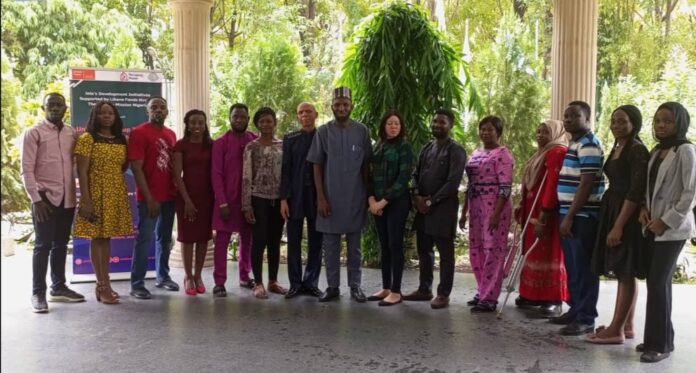…Tasks FG On Formulation Of Policies In Favour Of PWDs
The Chief Executive Officer of Jela’s Development Initiative, Angela Ochu-Baiye, has revealed plans by the nonprofit organisation to provide mental health support to 440 persons with disabilities in Nigeria.
Ochu-Baiye said JDI will provide the support through what she called the “Unburden Group Therapy Sessions and Advocacy for youths with Disabilities”
The group noted that the support would focus on reaching out to the blind, deaf, sickle cell warriors, those with Hansen’s Disease (leprosy), dwarfism, and albinism. JDI plans to also extend the support to family members of persons with disabilities in Abuja and Lagos in 2022.
Ochu-Baiye noted that mental health has not been taken seriously in Nigeria, while calling the government to make the right policies that positively affect persons with disabilities.
It is estimated that 17.4 million (32.9%) adults with disabilities experience frequent mental distress.
Speaking during a meeting with different organizations at Chida Hotel, Abuja, Ochu-Baiye stated that the project is beyond offering therapy as JDI will also talk about challenges young people with disabilities are faced with.
“Generally mental health is a conversation that seems not to been taken seriously, the mental health of every one of us. To talk about the mental health of people with disabilities, specifically young people with disabilities.
“So, for us in JDI, we advocate for mental health and care to be available for everyone, we decided that as part of this project working alongside The Leprosy Mission Nigeria (TLMN), we are going to involve ourselves in ensuring we can provide psychological support, specifically for young people with disabilities inclusive of their family members through what we call the unburden therapy session, that we will be made available here in Abuja and also in Lagos.
“This project is beyond just having the booked therapy session, it’s also going to be the advocacy work which we would be involved in as well to be able to raise issues of young people with disabilities are facing.
“Also, we are going to be having what we call the stories from unburdening, where we will highlight certain issues as well being on the field that this individual is virtual, saying that we know the exact issue that they are dealing with that affect their mental health and affects their well being in general.
“We want to include these six clusters of people with disabilities, the blind, the deaf, persons with dwarfism, Albinism, sickle cell warriors, and those affected with Leprosy. We decided to focus on this category of people living with disability, and ensure that we can offer certain mental health care facilities to them and their family members,” she said while appealing to the government to make the “right policy that would affect them positively, especially regarding their mental health.”
Also, Dr. Ifeanyi Izofor, a public health physician and a human center designer for the JDI, noted that the awareness of mental health problems in Nigeria is poor.
He said, “Mental health knowledge is very poor and also a part of mental health is that it stigmatizes. one way for us to begin to make it more prominent is by de-stigmatizing it, and a very important way of doing that is by improving knowledge of people as far as mental health is a concern, what the causes are, what the types are, what people should do when they feel like they have mental health issues.
“I think one of the major outputs of this particular project is the unburden session as JDI does very well under the disposition of a qualified and certified mental health therapist.”
The Chief Operating Officer of JDI, Angela, while giving a breakdown of the number of audiences they are targeting, stated that the hurdles in accessing mental health care have to be brought down.
She said, “The barriers to accessing mental health care have to be brought down generally with the mindset that persons with disabilities have a unique experience. One person with one type of disability can have a completely different experience from somebody else with another type of disability. So we need to take into consideration those peculiarities.
“We are targeting 440, so 20 sessions, hopefully, 22 in each section, youths specifically youths age between 16 and 25band their families members in Lagos and Abuja.”
THE WHISTLER


